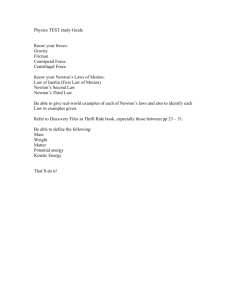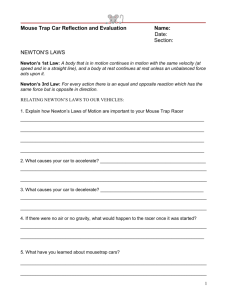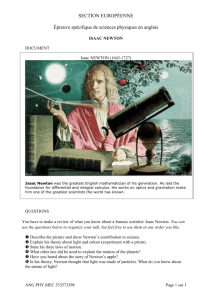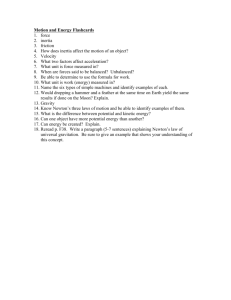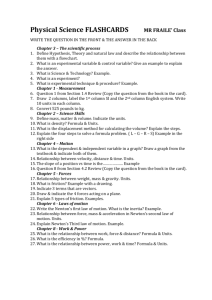Isaac Newton
advertisement
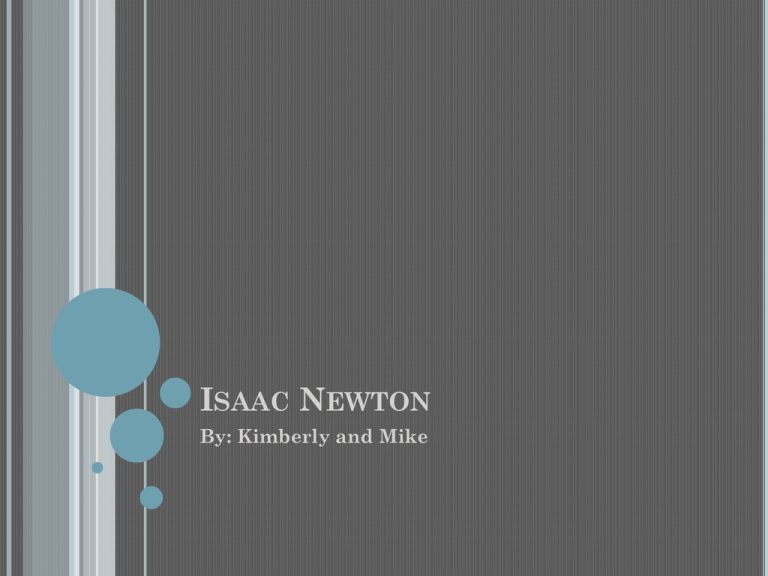
ISAAC NEWTON By: Kimberly and Mike ISAAC NEWTON oWas born in England on December 25, 1642 oDied on March 20, 1727 3 FUN FACTS Newton was also highly religious. He was an unorthodox Christian, and wrote more on Biblical hermeneutics and occult studies than on science and mathematics, the subjects he is mainly associated with. Newton secretly rejected Trinitarianism, fearing to be accused of refusing holy orders. Newton studied for a degree in law. He was elected as Member of Parliament for the University in 1700, but only held this for a year. NEWTON’S EDUCATION He attended Cambridge College where he studied law. His mother refused to pay for his college so while at college he worked as a servant to pay his way. Newton was also educated at The King's School, Grantham (where his alleged signature can still be seen upon a library window sill). He was removed from school, and by October 1659, he was to be found at Woolsthorpe-by-Colsterworth, where his mother, widowed by now for a second time, attempted to make a farmer of him. He hated farming. Henry Stokes, master at the King's School, persuaded his mother to send him back to school so that he might complete his education. Motivated partly by a desire for revenge against a schoolyard bully, he became the topranked student. MATHEMATICAL ACCOMPLISHMENTS Newton's work has been said "to distinctly advance every branch of mathematics then studied”. Newton is generally credited with the generalised binomial theorem, valid for any exponent. He discovered Newton's identities, Newton's method, classified cubic plane curves (polynomials of degree three in two variables), made substantial contributions to the theory of finite differences, and was the first to use fractional indices and to employ coordinate geometry to derive solutions to Diophantine equations. He approximated partial sums of the harmonic series by logarithms (a precursor to Euler's summation formula), and was the first to use power series with confidence and to revert power series. …CONTINUED His discoveries in mathematics were just as important. He came up with the Binomial Theorem and was one of the two creators of calculus. These discoveries represented a quantum leap in the fields of math and science allowing for calculations that more accurately modeled the behavior of the universe than ever before. Without these advances in math, scientists could not design vehicles to carry us and other machines into space and also plot the best and safest course. Calculus gave scientist the tools to set up a theoretical model of a situation and still account for varying factors. This basic knowledge would help scientist such as Einstein to be able make even greater discoveries such as the Theory of Relativity and Nuclear Fission. TIMELINE 1642-1651 England's Civil Wars 1653-1658 Oliver Cromwell in power 1658-1659 Richard Cromwell in power 1660 English monarchy is restored 1666 Great Fire of London 1685-1688 Rule of James II (Catholic) 1689-1702 William of Orange rules (after Glorious Revolution) 1707 Union between Scotland and England under the name of "Great Britain" 1777 American Revolution 1778 Alliance between United States and France 1781 Signing of the Constitution of the United States 1789 Outbreak of hostilities in France with the fall of the Bastille July 14 Abolition of French feudal system, Declaration of Rights of Man 1792 French Revolutionary Wars begin REFERENCES http://wiki.english.ucsb.edu/index.php/English_1 02:_Timeline_1642-1798 http://www.universetoday.com/38643/what-didisaac-newton-discover/ http://en.wikipedia.org/wiki/Isaac_Newton
